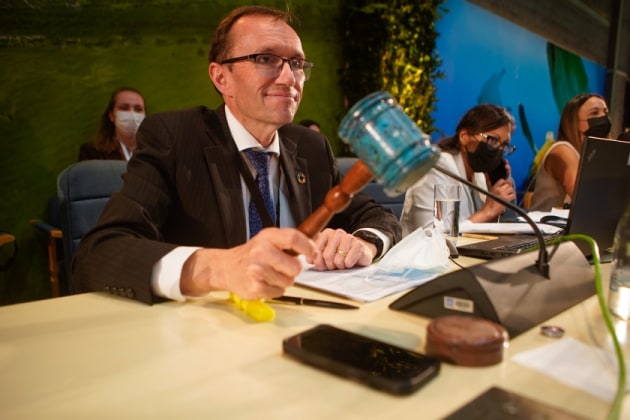The UN Environment Assembly resolution to begin negotiations for a global treaty to end plastic pollution is a major milestone for addressing the issue.
UN Environment Programme executive director Inger Andersen said the organisation had been in discussions with stakeholders to get a better understanding of the priorities, challenges, and requirements to create a plastics circular economy that works for industry and economies as well as meeting environmental and social objectives.

“We currently dump eleven million metric tons of plastic into the ocean each year and this figure is projected to double by 2030 and nearly triple by 2040.
“In 2018 alone, impacts on tourism, fisheries, and aquaculture together with other costs such as those of clean-ups, were estimated to be at least US$6-19 billion globally,” Andersen said.
Global plastic production has risen exponentially in the last decades and now amounts to around 400 million tonnes per year.
“Yet only an estimated 12 per cent of the plastics produced have been incinerated and only an estimated 9 per cent have been recycled.
“The remainder has either been disposed of in landfills or released into the environment, including the oceans.
“Without meaningful action, flows of plastic waste into aquatic ecosystems are expected to nearly triple from around 11 million tonnes in 2016 to around 29 million tonnes in 2040,” she said.
The treaty would create global rules and obligations for the full life cycle of plastic. It would set standards for reducing plastic production, consumption, and pollution, and hold nations, businesses and society accountable in eliminating plastic pollution from the environment.
“We will not recycle our way out of the plastic pollution crisis: we need a systemic transformation to achieve the transition to a circular economy,” Andersen said.
The full content of the treaty is expected to be developed for ratification by UN members by 2024.
A manifesto signed by many of the world’s leading companies in support of a UN treaty on plastic pollution has also been published.
The Australian Food and Grocery Council (AFGC) has welcomed the announcement. AFGC CEO Tanya Barden said the Australian food and grocery manufacturing sector has a keen interest in the UN EA resolution and the creation of a circular economy for plastics.
“While plastic is an effective and efficient material for maintaining food and grocery safety, it is important that we design, collect and re-use or recycle plastics to reduce their impact on the environment,” Barden said.
A major focus for Australian food and beverage manufacturers is dealing with hard to recycle plastics like soft plastics (chip packets, bread bags, cereal box liners).
“We are working with businesses to create a National Plastic Recycling Scheme (NPRS) to collect and transform these soft plastics into new food-grade plastic,” Barden said, adding the industry is working to stay ahead of the curve so all plastics are collected, recycled and reused.
“This also includes adopting the Australasian Recycling Label, redesigning packaging and looking at alternatives.”

(Image source: UNEP)
WWF-Australia No Plastics in Nature policy manager Kate Noble said the UN EA decision was an “historic moment” in the battle against plastic pollution.
“The decision by all UN member states to start work on a plastic pollution treaty is a huge milestone and testament to the hard work of so many Australians, scientists and campaigners over many years,” Noble said.
“If we’re going to regenerate Australia and build a more sustainable future, we need to tackle the products and processes that are contributing to the 130,000 tonnes of plastic that flows into Australia’s oceans every year.
“Today’s decision is incredibly important, but it really marks the start of the process. There will be a lot of hard work and strong leadership needed to ensure the treaty stops plastic pollution in its tracks, and Australia should be helping to shape that process,” Nobel said.
The UN member states have decided that the following elements should be considered in developing the new treaty:
- global objectives to tackle plastic pollution in marine and other environments and its impacts;
- global obligations and measures along the full lifecycle of plastics, including on product design, consumption and waste management;
- a mechanism for providing policy-relevant scientific information and assessment;
- a mechanism for providing financial support to the treaty implementation;
- national and international cooperative measures;
- national action plans and reporting towards the prevention, reduction, and elimination of plastic pollution; and
- treaty implementation progress assessment.
Boomerang Alliance director Jeff Angel said the resolution was a big step in addressing the full lifecycle of plastic, including production and design, as well as waste and pollution.
“An effective treaty is predicted to reduce plastic pollution by 80 per cent by 2040, and virgin plastic by 55 per cent, but it is essential nations curb these drivers even faster. Australia is well placed to do this to protect our oceans and health.
“Without this, some could ignore their obligations and affected countries would be condemned to perpetually cleaning up plastic pollution, while manufacturers could avoid responsibility for the products they produce,” Angel said.
Barden said the AFGC looks forward to the second half of the year when stakeholder input will be sought to progress the treaty.
“Australia has a lot to show for the working being done here including several announcements this week regarding new advanced recycling facilities that can convert soft plastic waste and mixed plastics to feedstock to make recycled polyethylene plastic for use in new, food-grade plastic packaging,” she said.
Resources:
Drowning in Plastics – Marine Litter and Plastic Waste Vital Graphics Oct 21
Ellen Macarthur Foundation/UNEP Global Commitments for Plastics






